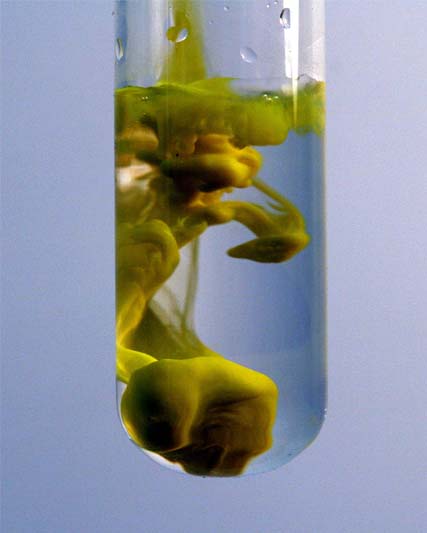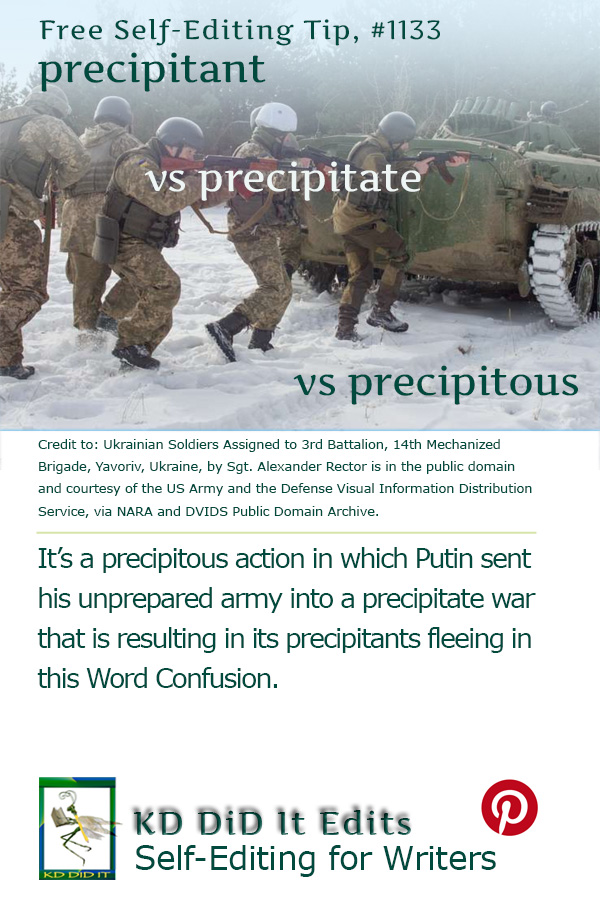a id=”top”>
Revised as of
18 Dec 2022
I’m not sure where this word confusion arose from, but it did intrigue me to ferret out the differences between precipitant vs precipitate vs precipitous.
Precipitant, precipitate, and precipitous are adjectives — precipitate is a noun and verb while precipitant is “merely” a noun.
Adjective-wise, all three are about falling. Precipitant falls headlong while precipitate and precipitous plunge steeply or vertically over the edge of a precipice, which is where the majority of the confusion arises.
Precipitant, as a noun, can be caused by a precipitate or precipitous decision. It can also be a psychological cause that causes the precipitate decision while the chemical aspect is the substance that forms a precipitate when added to a solution.
Precipitate emphasizes the suddenness of a plunge — a decision that is hasty and probably unwise — the Russians deciding to invade Ukraine. It can also be the product that results in a process, event, or course of action.
As a noun or verb, precipitate has a number of applications, including variations of the adjective:
- Sudden, hasty
- Meteorological events like rain and snow
- A chemical reaction
- Cause an event or situation to happen suddenly, unexpectedly, or prematurely
- Cause to move suddenly and with force
- Send someone or something suddenly out
Precipitous is about it being extremely steep in both literal and figurative senses — the stock market going down sharply (Brians).
Word Confusions . . .
. . . started as my way of dealing with a professional frustration with properly spelled words that were out of context in manuscripts I was editing as well as books I was reviewing. It evolved into a sharing of information with y’all. I’m hoping you’ll share with us words that have been a bête noire for you from either end.
If you found this post on “Precipitant vs Precipitate vs Precipitous” interesting, consider subscribing to KD Did It, if you’d like to track this post for future updates.
| Precipitant | Precipitate | Precipitous |
|---|---|---|

Lead (II) Iodide Precipitating Out of Solution is PRHaney‘s own work and is under the CC BY-SA 3.0 license, via Wikimedia Commons. — Potassium iodide is the precipitant. |

It’s Raining, New York City, by faungg’s photos is under the CC BY-ND 2.0 license, via Flickr. — A precipitate resulted in rain. |

Bungee Jumping by Tambako the Jaguar is under the CC BY-ND 2.0 license, via Flickr. — Eek! In my opinion, this is a precipitous decision. |
| Part of Grammar: | ||
| Adjective; Noun
Plural for the noun: precipitants |
Adjective 1; Noun 1; Verb 1, intransitive & transitive 2
Plural for the noun: precipitates Third person present verb: precipitates |
Adjective |
| Adjective: Falling headlong Hasty or impulsive
Rushing or falling rapidly or without heed Abrupt, unexpected, or sudden Noun:
|
Adjective: Done, made, or acting suddenly or without careful consideration 1
Headlong
Noun: A product resulting from a process, event, or course of action Moisture condensed in the form of rain, snow, etc. Verb, intransitive: [Meteorology] To fall from the air as a form of water, such as rain or snow Verb, transitive:
Cause (an event or situation, typically one that is bad or undesirable) to happen suddenly, unexpectedly, or prematurely 2
|
Dangerously high or steep
[Of an action] Done suddenly and without careful consideration |
| Examples: | ||
| Adjective: He made a precipitant decision. “They leave their little lives Above the clouds, precipitant to earth.” – J. Philips “Should he return, that troop so blithe and bold, Precipitant in fear would wing their flight.” – Pope “The Commotions in Ireland were so sudden, and so violent, that it was hard at first either to discerne the rise, or apply a remedy to that precipitant Rebellion” (Eikon). Noun: Depression may be a precipitant in many cases. The professor used a protein precipitant. “For young adults, loneliness and social isolation are major precipitants of suicide, experts say” (Brody). |
Adjective: I must apologize for my staff — their actions were precipitate. She took a precipitate fall down the stairs. There was a precipitate decline in cultural literacy. She precipitated herself into a struggle. The Russians made a precipitate retreat. It was a precipitate decision. He made a precipitate marriage. The rebels wondered whether they had been rather precipitate in deposing the king. Noun: “The resulting solution contains Na+, Ag+, Cl-, and NO3-, but AgCl is not soluble in water. Since Ag+ is now in solution with Cl- the two will combine to form AgCl, and the AgCl will precipitate from solution” (Precipitation). Snow and rain are precipitates that result in precipitation. Verb, intransitive: Mixing silver nitrate and sodium chloride in water will cause silver chloride to precipitate out of solution as a solid. “Similar values were found in iron-sulfur compounds that had precipitated out” (Timmer). Verb, transitive: “He was like a man who had never known liberty and was all at once precipitated into it” (Caldwell). Suddenly the ladder broke, precipitating them down into a heap. They were precipitated into a conflict for which they were quite unprepared. The cell proteins were then precipitated and washed in 10% trichloroacetic acid. Excess moisture is precipitated as rain, fog, mist, or dew. |
The general had to consider the precipitous cliffs of the North Atlantic coast.
The end of the war led to a precipitous decline in exports. Precipitous labor takes less than three hours after contractions first begin. He ignored the precipitous slope of the mountain. There was a precipitous decline in stock prices, which led to fears on Wall Street. Be careful of the precipitous rapids of the upper river. Chinese paintings frequently feature the country’s precipitous hills. |
| Derivatives: | ||
| Adjective: unprecipitant Adverb: precipitantly, unprecipitantly Noun: precipitance, precipitancy |
Adjective: precipitable, precipitative Adverb: precipitately Noun: precipitability, precipitateness, precipitation, precipitator |
Adjective: unprecipitous Adverb: precipitously, unprecipitously Noun: precipitousness |
| History of the Word: | ||
| Early 17th century, as an adjective in the sense acting hurriedly from the obsolete French précipitant, from the Latin praecipitans meaning hasty, present participle of praecipitare meaning precipitate. | Mid-17th century, from the obsolete French précipiteux, from the Latin praeceps, praecip(it)- meaning steep, headlong.
See precipitate. |
|
C’mon, get it out of your system, bitch, whine, moan . . . which words are your pet peeves? Also, please note that I try to be as accurate as I can, but mistakes happen or I miss something. Email me if you find errors, so I can fix them . . . and we’ll all benefit!
Satisfy your curiosity about other Word Confusions on its homepage or more generally explore the index of self-editing posts. You may also want to explore Book Layout & Formatting Ideas, Formatting Tips, Grammar Explanations, Linguistics, Publishing Tips, the Properly Punctuated, Writing Ideas and Resources, and Working Your Website.
Resources for Precipitant vs Precipitate vs Precipitous
Some of these links may be affiliate links, and I will earn a small percentage, if you should buy it. It does not affect the price you pay.
Apple Dictionary.com
Brians, Prof Paul. “precipitate / precipitous.” Washington State University. 30 May 2016. Web. 3 Dec 2022. <https://brians.wsu.edu/2016/05/30/precipitate-precipitous/>.
Brody, Jane E. “To Counter Loneliness, Find Ways to Connect.” The New York Times. 25 June 2018. Web. 3 Dec 2022. <https://www.nytimes.com/2018/06/25/well/to-counter-loneliness-find-ways-to-connect.html>.
Caldwell, Taylor. Answer as a Man. Originally published 1938. Open Road Media, 2016. <https://amzn.to/3Vwnf5e>. Ebook.
“Definition of Insoluble Salts (Precipitates). Chemical Dictionary. 2020. Web. 2 Dec 2022. <https://www.chemicool.com/definition/insoluble_salts_precipitates.html>.
Dictionary.com: precipitant, precipitate, precipitous
Eikon Basilike, Or, The King’s Book. 1649. London: A. Moring, Limited, At the De la More Press, 1904. Courtesy of Project Canterbury. <http://anglicanhistory.org/charles/eikon/12.html>.
The Free Dictionary: precipitant, precipitant, precipitate, precipitous
Gray, Ellen. “NASA Balances Water Budget with New Estimates of Liquid Assets.” Phys.org. 8 July 2015. Web. 2 Dec 2022. <https://phys.org/news/2015-07-nasa-liquid-assets.html>
Merriam-Webster: precipitant
“Precipitation Reactions.” Westfield State University. n.d. Web. 2 Dec 2022. <https://www.westfield.ma.edu/personalpages/cmasi/gen_chem1/Solutions/reactions%20in%20solution/precipitation_reactions.htm>.
Timmer, John. “3.5 Billion Year Old Organic Deposits Show Signs of Life.” Science. ARS Technica. 4 Sept 2012. Web. 2 Dec 2022. <https://arstechnica.com/science/2012/09/3-5-billion-year-old-organic-deposts-show-signs-of-life/>. Article.
WikiDiff: precipitant
Word Finder: precipitant
Pinterest Photo Credits:
Ukrainian Soldiers Assigned to 3rd Battalion, 14th Mechanized Brigade, Yavoriv, Ukraine, by Sgt. Alexander Rector is in the public domain and courtesy of the US Army and the Defense Visual Information Distribution Service, via NARA and DVIDS Public Domain Archive.


